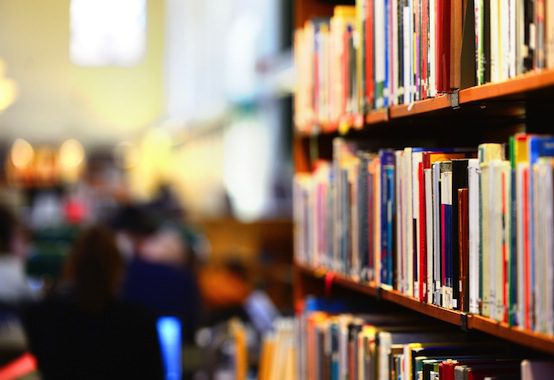Can Books and E-Readers Coexist?

A Pew Research Center report released last Wednesday revealed that, counter to popular sentiment, the public library is neither outdated nor ignored. In fact, according to an Atlantic article posted Friday, their approval rating is higher than apple pie and baseball: “That’s right. Public libraries not only rank more highly in the American psyche than Congress, journalists, and President Obama, but they also trump baseball and apple pie. Public libraries are more beloved than apple pie.”
A couple disclaimers must be introduced here: first, of the 91 percent who told Pew they had never had “a negative experience using a public library,” there are probably a few who’ve only been to the library once or twice in their lives. Additionally, some participants may view libraries in a withdrawn but pleasant light, as a nice place for old people or schoolchildren—but not for personal use.
But these provisos do not discount the overall positive picture drawn by Pew: they reported that the majority of Americans have either visited a public library or used a public library website in the past twelve months. Though the proportion is lower this year than last (54 percent versus 59 percent in 2012), that’s still a significant number—more significant than many of us would guess. Only 32 percent of participants said local library closure would not affect them and their families personally, whereas 90 percent said it would have an impact on the community—63 percent called it a “major” impact.
Perhaps we wrote the book obituary a bit too soon. The closure of Borders gave us a scare, and Barnes & Noble still seems to be salvaging itself in the wake of the Nook failure. But independent bookstores, despite the doomsday predictions, are doing quite well. The Washington Post reported Sunday on the opening of a new indie bookstore Maryland, where owners Marlene and Tom England “are defying the future,” according to writer Michael Rosenwald. The Englands credit the continuing popularity of print books with America’s “vintage” craze: “We think there’s a desire by many to go back to a very simple time,” Tom England told Rosenwald. “Kids are starting to play Risk again. People want to touch things. They want to be a little low-tech.”
This doesn’t mean Americans are throwing out their tablets: rather, they’ve become what customer Ryan Young calls “hybrid readers.” Americans use both print and digital editions, swapping iPads for hardbacks in a random but seemingly contented fashion. People continue to frequent libraries, despite their lack of technological features, because some still like the quiet, the books, and librarian assistance.
Could it be possible to live with the best of both worlds? Young thinks so: “There has to be a value in both,” she told the Post. “There are books on my bookshelves that are like my friends. You can go back to them over and over again.” It may be an idealistic hope, but perhaps books and e-readers, libraries and Amazon can coexist in peace and harmony. So far, so good.